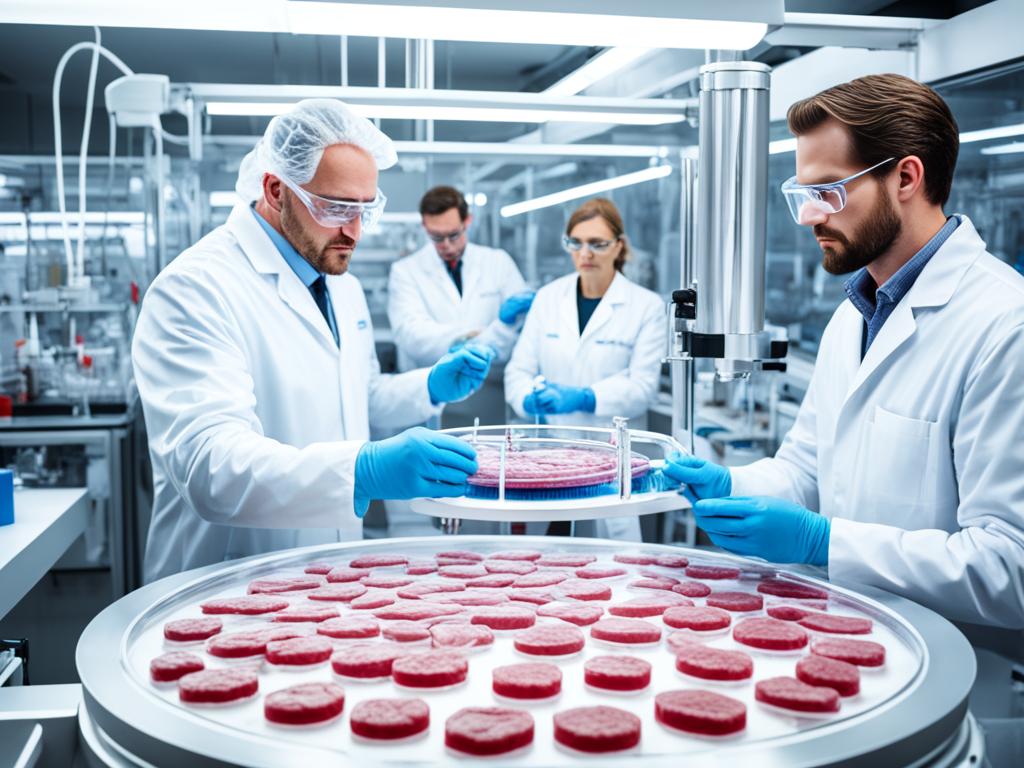Welcome to the future of dining, where lab-grown meat and alternative foods are transforming the way we eat. With the rise of lab-grown meat and the exploration of plant-based alternatives like Beyond Meat, we are witnessing a culinary revolution that is not only delicious but also environmentally sustainable. In this article, we will delve into the exciting advancements in the world of dining, focusing on the sustainability of future foods from an environmental perspective and the importance of ethical eating.
Key Takeaways:
- The rise of lab-grown meat is revolutionizing meat production and offering a sustainable alternative to traditional methods.
- Exploring plant-based alternatives like Beyond Meat provides eco-friendly dining options without compromising taste or texture.
- The sustainability of future foods is essential for mitigating the environmental impact of food production.
- Choosing to eat ethically means considering animal welfare, food ethics, and conscious consumption.
- The future of dining holds exciting opportunities for culinary advancements and innovative food technology.
Lab-Grown Meat: Redefining Meat Production
In today’s world, the concept of sustainable meat production is gaining significant traction. As concerns about the environmental impact of traditional animal farming grow, researchers and scientists are exploring alternative methods to meet the global demand for meat. One such groundbreaking innovation is lab-grown meat.
Lab-grown meat, also known as cultured meat, is produced by using cell cultures in a laboratory setting rather than raising and slaughtering animals. This cutting-edge technology allows scientists to grow real animal tissue, which closely resembles conventional meat, but without the need for animal farming.
The production process begins with a small sample of animal cells, such as muscle cells or stem cells, which are then placed in a nutrient-rich medium to encourage cell growth. Over time, these cells multiply and form muscle tissue that can be harvested and processed into various meat products.
Lab-grown meat offers several advantages in terms of sustainable meat production. Firstly, it significantly reduces the environmental impact associated with conventional animal farming. Traditional livestock farming requires vast amounts of land, water, and resources, contributing to deforestation, greenhouse gas emissions, and water pollution. In contrast, lab-grown meat has a much smaller ecological footprint and could potentially pave the way for a more sustainable food system.
Additionally, lab-grown meat has the potential to address the growing concerns about animal welfare. By eliminating the need for animal slaughter, cultured meat reduces animal suffering while still providing the same nutritional benefits as conventionally produced meat.
In the pursuit of alternative protein sources, lab-grown meat holds great promise. It offers a way to meet the global demand for meat without relying solely on animal agriculture. Additionally, lab-grown meat can be customized to meet specific nutritional needs, making it an attractive option for individuals seeking healthier and more personalized food choices.
As the field of lab-grown meat continues to evolve, researchers and companies are investing in research and development to refine the production process and make cultured meat more accessible and affordable. While it is still in its early stages, the potential of lab-grown meat to revolutionize meat production and contribute to a more sustainable future is undeniable.
Exploring Plant-Based Alternatives: Beyond Meat and Beyond
In today’s rapidly evolving food landscape, plant-based alternatives have emerged as a popular choice for health-conscious individuals looking to make eco-friendly dining options. One brand that has captured the attention of both vegans and meat-lovers alike is Beyond Meat. With its innovative approach to plant-based proteins, Beyond Meat has successfully transformed the way we think about alternative dining options.
Plant-Based Alternatives: A World of Possibilities
Gone are the days when plant-based alternatives were limited to tofu and soy-based products. Today, there is a wide range of plant-based proteins available that can satisfy even the most discerning palates. From hearty burgers and sausages to delectable meatballs and chicken substitutes, the options are truly endless.
“Beyond Meat has become a game-changer in the plant-based industry, offering products that are not only delicious but also provide a remarkable meat-like texture. It’s an exciting time for those seeking alternative protein sources.”
The Environmental Advantages of Plant-Based Dining Options
Choosing plant-based alternatives over traditional meat products has numerous environmental benefits. The production of plant-based proteins requires significantly less land, water, and energy compared to animal farming. It contributes to a reduction in greenhouse gas emissions and helps conserve precious natural resources. By opting for plant-based dining options, you can actively contribute to a more sustainable future.
The Impact of Beyond Meat
Beyond Meat’s impact on the plant-based food industry cannot be understated. Their innovative approach to creating plant-based proteins that mimic the taste, texture, and appearance of meat has attracted a growing number of consumers. Beyond Meat products are now available in restaurants, fast-food chains, and grocery stores across the globe, making it easier for individuals to embrace a plant-based lifestyle.
The Future of Plant-Based Alternatives
As the demand for eco-friendly dining options continues to rise, it is evident that plant-based alternatives are here to stay. Beyond Meat’s success has paved the way for other brands to innovate in the plant-based market, ensuring that consumers have a wide variety of appetizing and sustainable options to choose from in the future.
| Beyond Meat | Traditional Meat | |
|---|---|---|
| Taste | Delicious and meat-like | Varies depending on preparation |
| Texture | Similar to meat | Varies depending on cut |
| Sustainability | Eco-friendly | Environmental impact |
| Animal Welfare | Cruelty-free | Animal farming |
The Environmental Perspective: Sustainability of Future Foods
In this section, we will examine the sustainability aspect of future foods. We will delve into the environmental impact of traditional food production methods and explore the role of sustainable agriculture in mitigating these issues. Additionally, we will emphasize the importance of making eco-conscious choices to shape a more sustainable future.
The Environmental Impact of Food Production
Traditional food production methods can have a significant environmental impact. From deforestation to the excessive use of water and energy, the production and distribution of food contribute to greenhouse gas emissions and biodiversity loss. These practices can also lead to soil degradation, water pollution, and habitat destruction, further exacerbating environmental challenges.
To address these issues, it is crucial to adopt sustainable agricultural practices.
The Role of Sustainable Agriculture
Sustainable agriculture focuses on maximizing food production while minimizing environmental harm. By implementing regenerative farming techniques, such as organic farming, agroforestry, and precision agriculture, farmers can reduce the use of synthetic chemicals, optimize resource utilization, and promote ecosystem health.
These sustainable practices not only help preserve the environment but also enhance soil fertility, increase biodiversity, and improve water management. They support the long-term viability of farming systems while minimizing the negative impact on ecosystems.
Making Eco-Conscious Choices
As consumers, we play a vital role in shaping the future of food production. By making eco-conscious choices, we can contribute to a more sustainable food system.
One way to make a positive impact is by supporting local and organic food producers. By purchasing locally grown produce, you reduce the carbon footprint associated with transportation and support local farmers. Choosing organic products also promotes sustainable farming practices that prioritize soil health and biodiversity preservation.
Another eco-conscious choice is to reduce food waste. By planning meals, storing food properly, and repurposing leftovers, you help minimize the environmental impact of food production, transportation, and disposal.
Lastly, consider incorporating plant-based meals into your diet. Plant-based diets have been shown to have a lower environmental footprint compared to diets rich in animal products. By opting for more fruits, vegetables, grains, and legumes, you contribute to sustainable food production and reduce the demand for resource-intensive animal agriculture.
Shaping a Sustainable Future
By understanding the environmental impact of food production and embracing sustainable agriculture, we can take steps towards shaping a more sustainable future. Making eco-conscious choices, such as supporting local and organic producers, reducing food waste, and incorporating plant-based meals, empowers individuals to make a positive difference. Together, we can create a food system that prioritizes environmental stewardship and ensures a healthier planet for generations to come.
Ethical Eating: Making a Difference through Food Choices
When it comes to the food we consume, our choices have the power to create a positive impact on animal welfare, food ethics, and the environment. Ethical eating is about consciously considering the consequences of our food choices and making decisions that align with our values.
One crucial aspect of ethical eating is animal welfare. By choosing to support brands and products that prioritize animal welfare, we can contribute to creating a more compassionate and humane food system. This means opting for meat, dairy, and eggs from sources that prioritize the well-being and proper treatment of animals. Supporting local and sustainable farming practices can also have a significant impact on animal welfare.
Food ethics also play a vital role in ethical eating. It involves considering the environmental, social, and economic implications of our food choices. By supporting companies that embrace fair trade practices, workers’ rights, and sustainable sourcing, we can contribute to a more ethical food system.
“Ethical eating means considering the consequences of our food choices and making decisions that align with our values.” – [Your Name]
Conscious consumption is another fundamental aspect of ethical eating. It involves being mindful of the resources, such as water, land, and energy, that go into producing our food. Making choices that prioritize sustainable agriculture, organic farming, and minimizing waste can help reduce our environmental impact.
Through ethical eating, we have the power to make a difference. Each meal we consume is an opportunity to support practices that value animal welfare, food ethics, and conscious consumption. By making informed decisions and choosing brands and products that share our values, we can contribute to a more sustainable and ethical food system.
The Impact of Ethical Eating
Ethical eating goes beyond personal choices. It has the potential to drive significant change in the food industry. When consumer demand prioritizes animal welfare, food ethics, and conscious consumption, companies are more likely to respond and adjust their practices accordingly. This creates a positive ripple effect throughout the food system, promoting more sustainable and ethical practices.
As consumers, our voices matter. By actively supporting ethical eating and making choices aligned with our values, we can influence the market, encourage transparency, and pave the way for a future where ethical considerations are at the forefront of the food industry.
Unlocking the Potential: Future Developments and Innovations
As we move closer to the future of dining, exciting developments and innovations are poised to transform the culinary landscape. Incorporating cutting-edge food technology and embracing culinary advancements, the future of dining holds endless possibilities for chefs, food enthusiasts, and consumers alike.
One area of innovation that is gaining traction is the exploration of lab-grown meat and alternative foods. Lab-grown meat, also known as cultured meat, offers a sustainable solution to traditional meat production. With advancements in cellular agriculture, scientists are able to grow meat in a lab without the need for conventional farming methods. This innovative approach not only minimizes environmental impact but also addresses concerns related to animal welfare.
Plant-based alternatives are another avenue of culinary exploration. Beyond Meat, a leading brand in the plant-based food industry, has made waves with their range of meat substitutes. By harnessing the power of plant-based proteins, Beyond Meat offers a viable option for those seeking eco-friendly and delicious dining choices. These alternatives not only cater to vegetarian and vegan diets but also contribute to reducing the ecological footprint of our food system.
Food technology plays a pivotal role in shaping the future of dining. From advancements in food processing and preservation techniques to the development of innovative kitchen appliances, technology continues to revolutionize the way we prepare and enjoy our meals. As consumers become more conscious of what they eat, technology enables the creation of healthier, more nutritious options, while preserving flavors and textures.
As the future unfolds, the culinary landscape will witness a fusion of traditional techniques and technological innovations, creating new and exciting dining experiences.
Opportunities for Culinary Exploration
The future of dining brings forth exciting opportunities for chefs and food enthusiasts to experiment and push the boundaries of culinary creativity. With the availability of alternative ingredients and evolving cooking techniques, chefs can create innovative dishes that cater to diverse dietary preferences and cultural influences.
Furthermore, advancements in food technology open doors for interactive dining experiences. Virtual reality (VR) and augmented reality (AR) can transport diners to different locations, allowing them to immerse themselves in a virtual dining adventure. From exploring ancient cultures to dining on a space station, these technologies offer a new dimension to culinary storytelling.
Moreover, the integration of robotics and automation streamlines kitchen processes, enabling chefs to focus on culinary artistry and creativity. Automated systems can handle repetitive tasks, freeing up time for chefs to experiment with flavors, presentation, and overall dining experiences.
As we embrace the future of dining, it is essential to continue fostering collaborations between chefs, food scientists, and technologists. By combining expertise from different fields, we can unlock the full potential of future developments and innovations, enriching the culinary landscape and providing unique dining experiences to food enthusiasts around the world.
| Benefits of Future Developments in Dining | Opportunities for Culinary Exploration |
|---|---|
| 1. Sustainable meat production through lab-grown meat | 1. Experimentation with alternative ingredients |
| 2. Eco-friendly plant-based alternatives | 2. Immersive dining experiences with VR and AR |
| 3. Preservation of flavors and textures with food technology | 3. Integration of robotics to streamline kitchen processes |
| 4. Healthier and more nutritious food options | 4. Collaboration between chefs, scientists, and technologists |
Conclusion
In conclusion, we have explored the future of dining, focusing on the exciting advancements in lab-grown meat and alternative foods. Through the rise of lab-grown meat and the exploration of plant-based alternatives like Beyond Meat, we have witnessed the potential to revolutionize meat production and offer eco-friendly dining options. Additionally, the sustainability of future foods from an environmental perspective and the importance of ethical eating have been key takeaways from our discussion.
By embracing these concepts, you can contribute to shaping a sustainable and ethical way of dining that benefits both your health and the planet. Choosing lab-grown meat and plant-based alternatives not only reduces the environmental impact of traditional food production but also promotes animal welfare. By making conscious consumption choices, you can actively support a more sustainable food system and make a positive difference.
The future of dining holds exciting possibilities, with ongoing developments and innovations in food technology and culinary advancements. By staying informed and open to new ideas, you can actively participate in shaping the future of dining and contribute to a more sustainable and ethical gastronomic landscape. Embrace the journey towards a future where dining is not only flavorful and satisfying but also aligns with your values and respects the planet we call home.







